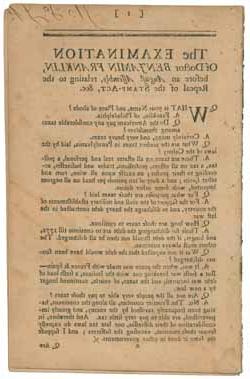The Examination of Doctor Benjamin Franklin, before an August Assembly, relating to the Repeal of the Stamp-Act, &c.
To order an image, navigate to the full
display and click "request this image"
on the blue toolbar.
-
Choose an alternate description of this item written for these projects:
- Main description
[ This description is from the project: Coming of the American Revolution ]
This pamphlet contains Benjamin Franklin's testimony in January 1766 before the House of Commons, the lower house of Parliament. Franklin answered 174 questions, provided testimony to help British lawmakers understand the colonists' resistance to British policies and argued for the repeal of the Stamp Act.
Franklin, of Philadelphia
In January 1766, Benjamin Franklin appears before the House of Commons to advocate for a repeal of the Stamp Act of 1765. His testimony makes a great impression and is quickly published in London and the Colonies. Dr. Franklin is providing evidence in the form of answers to no less than 174 questions. The session, according to the Proceedings of Parliament, lasts for four hours. The erudite Franklin shares his observations on the attitude of the colonists towards the British Empire before and after the imposition of the Stamp Act, and comments on issues of taxation, representation, and the ability of the colonies to become economically independent from the mother country.
Questions to Consider
1. According to Doctor Franklin, what kinds of taxes do people pay in the colonies, and what happens when people are unable to pay them? [p. 1]
2. How does he answer the question about the colonies being protected without helping to pay for this protection? [p. 4]
3. How does Franklin describe the change in attitude of the colonies towards Britain and towards Parliament specifically before and after 1763? In his opinion, what factors account for this change? [pp. 5-6]
4. How does he feel that future taxes would be received by the colonists? [p. 6]
5. How does Franklin distinguish between "external" and "internal" taxes? How would people avoid paying the former? [pp. 8-9]
6. What does Dr. Franklin mean by saying that if British soldiers are sent into the colonies, "They will not find a rebellion; they may indeed make one."? [p. 11]
7. According to Franklin, what will the colonists do if the Stamp Act is not repealed, and how will they accomplish this? Does America need its Mother Country? [pp. 11-12]
8. If the Crown wants help from the colonists, what should the procedure be, in Franklin's view? [p. 12]
9. Explain this dialogue in your own words: "Q. What used to be the pride of the Americans? A. To indulge in the fashions and manufactures of G. Britain. Q. What is now their pride? A. To wear their old cloaths over again, till they can make new ones." [p. 23]
Further Exploration
10. Why was Benjamin Franklin called to testify in front of Parliament as a representative of the American colonists? Why was he so well known and trusted by those whom invited him? On what was his reputation based?
11. According to Franklin, America's role in the "last war" (the French and Indian) was seriously misrepresented. How does he attempt to correct that? Based on your own research, what other evidence could Franklin have provided? [pp. 16-18]
12. Franklin says that the colonists understand that they are entitled to all the "privileges and liberties of Englishmen". What were those privileges and liberties, those "common rights of Englishmen," and how did they come to be? [pp. 21-22]
13. Franklin states, toward the end of his examination, "No power, how great fo(r)ever, can force men to change their opinions." Use these words as the basis of a reflective essay with examples drawn from other times and places.

